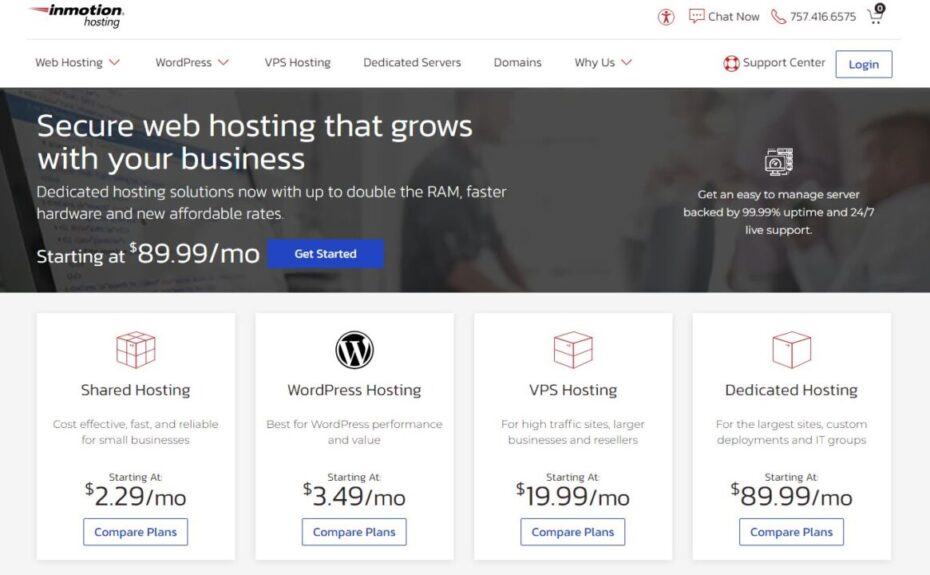Table of Contents
Some links on The Justifiable are affiliate links, meaning we may earn a small commission at no extra cost to you. Read full disclaimer.
Understanding web hosting and its types is crucial for anyone looking to establish an online presence. This guide will walk you through what web hosting is, the different types available, and the benefits each type offers.
What is Web Hosting? Understanding the Basics
Web hosting is a fundamental aspect of having an online presence. It refers to the service that allows individuals and organizations to make their website accessible on the internet.
When you choose a web hosting provider, you’re essentially renting space on a server where all your website’s files are stored and managed. This makes it possible for users around the world to visit your website by typing your domain name into their web browser.
I believe understanding the basics of web hosting is crucial for anyone looking to create a website. My intention is to provide you with a clear and friendly explanation that will help you navigate the world of web hosting with confidence. Let’s delve deeper into the importance and functionality of web hosting.
Web Hosting Recommendations
 Hostgator
|  Inmotion
|  Hostinger
|
Definition and Importance of Web Hosting
Web hosting, in its simplest terms, is a service that stores your website files on a server connected to the internet. According to experts, without web hosting, your website would not be accessible to others. This is because web hosting companies provide the technology and infrastructure needed to keep your website up and running 24/7.
Most importantly, I recommend choosing a reliable web hosting provider to ensure that your website remains accessible and performs well. My advice is to look for features such as uptime guarantees, customer support, and scalability options. I suggest considering the specific needs of your website when selecting a hosting plan, as different types of hosting offer various benefits.
Having a good web hosting service is crucial for the success of your online presence. It impacts your site’s speed, security, and overall performance. I would say that investing in quality web hosting can lead to better user experience and higher search engine rankings.
How Web Hosting Works for Your Website
When you upload your website’s files to your web hosting provider’s server, they become available on the internet. This process involves using file transfer protocol (FTP) or a control panel provided by the hosting service. Once your files are on the server, the hosting company ensures that they are stored securely and are accessible to visitors at any time.
I suggest understanding the different components involved in web hosting to make an informed decision. For instance, bandwidth and storage are key factors that determine how much data can be transferred and how much space your website has. According to many professionals, adequate bandwidth ensures that your website can handle traffic spikes without slowing down.
My recommendation is to start with a hosting plan that matches your current needs but also offers room for growth. As your website attracts more visitors, you may need to upgrade to a plan with more resources. I think flexibility and scalability are important considerations when choosing a web hosting provider.
Moreover, most web hosting services offer additional features such as email hosting, security measures, and backups. These features enhance the functionality and security of your website. My suggestion is to evaluate these offerings carefully and select a hosting plan that provides the best value for your needs.
Exploring Different Types of Web Hosting
When it comes to web hosting, there are several types available, each catering to different needs and budgets. Understanding these options can help you make an informed decision about which type of web hosting is best for your website. From shared hosting to VPS hosting, each type has its own unique features and benefits.
I think it’s essential to choose a web hosting type that aligns with your website’s requirements. My intention is to provide a detailed overview of the most popular types of web hosting, so you can decide which one is right for you. Let’s start with shared hosting and VPS hosting.
Shared Hosting: Affordable and Beginner-Friendly
Shared hosting is a popular choice for those new to website creation. In this type of hosting, multiple websites are hosted on a single server, sharing its resources. This makes it a cost-effective solution, especially for beginners who are just starting out and may have limited budgets.
According to many users, shared hosting is easy to set up and manage, making it ideal for personal blogs, small business websites, and informational sites.
Most importantly, I recommend shared hosting if you’re looking for an affordable way to get your website online. My suggestion is to choose a reputable hosting provider that offers good customer support and reliable uptime.
I believe that while shared hosting is budget-friendly, it does have limitations in terms of performance and resource allocation, which can affect site speed during high traffic periods.
In shared hosting, server resources such as CPU, RAM, and storage are distributed among all the websites hosted on that server. This can sometimes lead to slower load times if other websites experience traffic spikes. My advice is to monitor your site’s performance and consider upgrading to a higher hosting plan if you notice consistent slowdowns.
One of the key benefits of shared hosting is its simplicity. Most hosting providers offer user-friendly control panels, one-click installations for popular applications like WordPress, and basic security features. I suggest taking advantage of these tools to streamline your website management process.
Overall, shared hosting is a great starting point for many websites. I recommend it for those who need an affordable and straightforward hosting solution. As your website grows and requires more resources, you can always upgrade to a more robust hosting option.
VPS Hosting: Enhanced Performance and Flexibility
VPS (Virtual Private Server) hosting offers a middle ground between shared hosting and dedicated hosting. In VPS hosting, a physical server is divided into several virtual servers, each with its own dedicated resources.
This setup provides enhanced performance, greater control, and more flexibility compared to shared hosting. I believe VPS hosting is ideal for websites that have outgrown shared hosting but are not yet ready for dedicated hosting.
One of the main advantages of VPS hosting is its improved performance. Since your website has dedicated resources, it is less likely to be affected by the traffic and activities of other websites. My recommendation is to consider VPS hosting if you need a reliable and high-performing hosting environment for your growing website.
Another benefit of VPS hosting is the level of control it offers. With root access to your virtual server, you can install custom software, configure server settings, and manage security protocols. My suggestion is to utilize this control to optimize your server environment according to your specific needs.
I would say that VPS hosting also provides better scalability compared to shared hosting. As your website grows, you can easily upgrade your server resources without experiencing downtime. According to many users, this scalability is a crucial factor in ensuring their website can handle increased traffic and demand.
Dedicated Hosting: Ultimate Control and Resources
Dedicated hosting provides a hosting environment where you have an entire server exclusively for your website. This means you have full control over the server’s resources, configurations, and security settings. I believe dedicated hosting is ideal for high-traffic websites or those requiring extensive resources.
Most importantly, my recommendation is to opt for dedicated hosting if your website demands high performance, security, and customizability. I suggest considering this option if you run an e-commerce site, a large business website, or any project that needs robust server capabilities. With dedicated hosting, you won’t have to worry about other websites impacting your server’s performance.
One of the significant advantages of dedicated hosting is the level of control it offers. You can customize the server environment to meet your specific needs, including the installation of custom software and configurations. According to many experts, this control can significantly enhance your website’s performance and security.
Additionally, dedicated hosting ensures that all server resources are available exclusively to your site. My advice is to leverage this to handle large volumes of traffic without experiencing slowdowns. I would say that this type of hosting provides the reliability and stability that high-traffic websites require.
Cloud Hosting: Scalability and Reliability
Cloud hosting is a modern hosting solution that uses a network of virtual servers to host websites. This setup offers excellent scalability and reliability, making it suitable for websites with fluctuating traffic levels. I think cloud hosting is particularly beneficial for businesses looking for flexibility and resilience.
My suggestion is to consider cloud hosting if you anticipate varying traffic patterns. This type of hosting allows you to scale resources up or down based on demand, ensuring optimal performance at all times. According to many users, the pay-as-you-go model of cloud hosting can also be cost-effective.
One of the primary benefits of cloud hosting is its reliability. Since your website is hosted on multiple servers, it can handle traffic spikes and server failures more effectively. I recommend cloud hosting for its ability to provide continuous availability and quick recovery from issues.
Moreover, cloud hosting offers excellent load balancing and redundancy. My advice is to use these features to ensure that your website remains accessible and performs well, even during peak traffic periods. I would say that this type of hosting can provide a seamless user experience for your visitors.
Managed Hosting: Hassle-Free Maintenance
Managed hosting is a hosting solution where the service provider handles all the technical aspects of server management. This includes updates, security, backups, and performance optimization. I believe managed hosting is an excellent option for those who want to focus on their core business without worrying about server maintenance.
Most importantly, I recommend managed hosting if you lack technical expertise or simply prefer to leave server management to professionals. My suggestion is to opt for this type of hosting to ensure your website runs smoothly without the hassle of technical upkeep.
One of the main advantages of managed hosting is the professional support it offers. With experts managing your server, you can rest assured that any issues will be resolved promptly. I would say that this allows you to concentrate on growing your business rather than dealing with technical problems.
Additionally, managed hosting often includes enhanced security measures. According to many providers, regular security updates and monitoring are part of the service, which helps protect your website from threats. My advice is to utilize these security features to keep your website safe and secure.
Lastly, managed hosting providers typically offer excellent customer support. My recommendation is to take advantage of this support to address any concerns or questions you might have. I think the peace of mind that comes with knowing your website is in good hands is invaluable for business owners.
Advantages of Shared Hosting for Small Websites
Shared hosting is a popular choice among small websites due to its affordability and ease of use. It allows multiple websites to share the same server resources, making it a cost-effective solution for those just starting out. According to many web hosting experts, shared hosting is an excellent option for personal blogs, small business websites, and informational sites.
I believe shared hosting is ideal for small websites that don’t require extensive resources. My recommendation is to consider shared hosting if you’re looking for a budget-friendly option that still provides reliable performance. Most importantly, shared hosting offers a simple way to get your website online without a significant upfront investment.
Cost-Effective Solution for Beginners
One of the main benefits of shared hosting is its affordability. Since server resources are shared among multiple users, the cost of maintaining the server is distributed, making it a low-cost option. My suggestion is to choose shared hosting if you’re on a tight budget and want to minimize expenses while still getting a reliable hosting service.
Most importantly, shared hosting plans often come with a range of features that are beneficial for beginners. These plans usually include easy-to-use control panels, one-click installations for popular applications, and basic security measures. I would say that these features make it easy for anyone to set up and manage their website, even with little technical knowledge.
Another advantage of shared hosting is the availability of customer support. Many hosting providers offer 24/7 support to help you with any issues that may arise. According to users, this can be particularly helpful for beginners who may need assistance navigating the hosting environment. My advice is to look for a provider with a strong reputation for customer service.
In addition to cost savings, shared hosting often comes with additional perks such as free domain registration and email accounts. These added benefits can enhance your website’s functionality without incurring extra costs. I recommend taking advantage of these offerings to get the most value from your shared hosting plan.
Ease of Use and Setup for New Users
Shared hosting is known for its user-friendly setup process, which is ideal for those who are new to web hosting. The intuitive control panels provided by hosting companies simplify the management of your website. My suggestion is to choose a hosting provider that offers a comprehensive control panel, such as cPanel, to make managing your website as straightforward as possible.
I believe the simplicity of shared hosting is one of its greatest strengths. The one-click installation features available with many shared hosting plans allow you to quickly install popular content management systems like WordPress. My advice is to use these tools to streamline your website setup and get your site up and running in no time.
In shared hosting, the hosting provider takes care of server maintenance, updates, and security. This means you can focus on creating content and growing your website without worrying about technical details. I would say that this hands-off approach is perfect for those who want a hassle-free hosting experience.
Most importantly, shared hosting plans often come with step-by-step guides and tutorials to help you through the setup process. According to many new users, these resources are invaluable for learning how to manage a website effectively. My recommendation is to utilize these guides to gain a better understanding of web hosting and to ensure a smooth setup process.
Overall, the ease of use and affordability of shared hosting make it an attractive option for beginners. If you’re looking to start a website without a significant financial or technical burden, I suggest exploring shared hosting as a viable solution.
Benefits of VPS Hosting for Growing Businesses
As your business grows, so do the demands on your website. VPS (Virtual Private Server) hosting offers a middle ground between shared and dedicated hosting, providing enhanced performance and flexibility. I think VPS hosting is an excellent choice for businesses that need more resources and control than shared hosting can offer.
My recommendation is to consider VPS hosting if your website is experiencing increased traffic and you need a more reliable and scalable solution. Most importantly, VPS hosting provides a dedicated portion of a server’s resources, ensuring better performance and stability for your growing business.
Improved Performance and Resources Allocation
One of the primary benefits of VPS hosting is the improved performance it offers. Unlike shared hosting, where resources are divided among many users, VPS hosting allocates a dedicated portion of the server’s CPU, RAM, and storage to your website. This means your site can handle higher traffic volumes without slowing down. According to many experts, this enhanced performance can lead to a better user experience and higher search engine rankings.
I believe VPS hosting is particularly beneficial for businesses that rely on their website for revenue. My suggestion is to choose VPS hosting if you’re running an e-commerce site, as the increased performance can help reduce page load times and improve customer satisfaction. Most importantly, a faster website can lead to higher conversion rates and sales.
Another advantage of VPS hosting is the stability it offers. Since your resources are dedicated, your website is less likely to be affected by the activities of other users on the server. This isolation ensures consistent performance, which is crucial for maintaining a professional online presence. My advice is to opt for VPS hosting if you need a stable and reliable hosting environment.
In addition to improved performance, VPS hosting allows for better resource management. You can easily monitor and manage your server resources, ensuring your website operates efficiently. I would say that this level of control is essential for growing businesses that need to optimize their online operations continually.
Greater Control and Customization Options
VPS hosting also provides greater control over your hosting environment compared to shared hosting. With VPS hosting, you have root access to your server, allowing you to install custom software, modify server configurations, and manage security settings. According to many professionals, this level of control is invaluable for businesses with specific technical requirements.
I believe that having the ability to customize your server environment can significantly enhance your website’s performance and security. My recommendation is to take advantage of this control to tailor your hosting setup to meet your business’s unique needs. Most importantly, this flexibility allows you to implement advanced security measures to protect your website and customer data.
Another key benefit of VPS hosting is its scalability. As your business grows, you can easily upgrade your server resources to accommodate increased traffic and demand. My suggestion is to choose a VPS hosting plan that offers easy scalability options, ensuring you can expand your resources without experiencing downtime or performance issues.
Additionally, VPS hosting often comes with robust technical support. Hosting providers typically offer comprehensive support to help you manage and optimize your server. I would say that having access to expert assistance can be a significant advantage, especially if you’re not familiar with server management. My advice is to utilize this support to ensure your VPS hosting environment is always running smoothly.
Overall, VPS hosting offers a powerful and flexible solution for growing businesses. If you need enhanced performance, greater control, and scalability, I recommend considering VPS hosting as your next step in web hosting.
Why Choose Dedicated Hosting for High-Traffic Sites
Dedicated hosting is an excellent choice for high-traffic websites that require maximum performance and security. By providing a server entirely dedicated to your website, dedicated hosting ensures that you have all the resources you need without sharing them with other users. I believe this type of hosting is ideal for businesses that need top-tier performance and reliability.
My recommendation is to opt for dedicated hosting if your website experiences significant traffic or requires extensive computational power. Most importantly, dedicated hosting offers unparalleled control and customization options, making it a robust solution for businesses with complex needs.
Maximum Performance and Security Features
One of the primary advantages of dedicated hosting is the superior performance it offers. Since you have an entire server to yourself, your website can handle large volumes of traffic without experiencing slowdowns. According to many hosting experts, this leads to faster load times and a better user experience, which is crucial for retaining visitors and improving search engine rankings.
I think the performance benefits of dedicated hosting are particularly valuable for e-commerce sites and high-traffic blogs. My advice is to choose dedicated hosting if you need to ensure that your site remains fast and responsive, even during peak traffic times. Most importantly, a faster website can lead to higher conversion rates and increased customer satisfaction.
In addition to performance, dedicated hosting provides advanced security features. With your server isolated from others, you have full control over security configurations, allowing you to implement stringent measures to protect your data. According to security professionals, dedicated hosting is less vulnerable to cyber-attacks compared to shared environments. My recommendation is to utilize dedicated hosting if your website handles sensitive information or requires high levels of security.
Another benefit is the ability to customize security settings to fit your specific needs. You can install firewalls, anti-malware tools, and other security software tailored to your website. I would say that this customization capability makes dedicated hosting a strong choice for businesses that prioritize security. My suggestion is to work with your hosting provider to optimize your server’s security setup.
Full Administrative Control Over Server
Dedicated hosting offers complete administrative control over your server, giving you the ability to manage every aspect of your hosting environment. With root access, you can install custom software, configure server settings, and optimize performance according to your specific requirements. According to many IT professionals, this level of control is essential for businesses with unique technical needs.
I believe having full control over your server is one of the biggest advantages of dedicated hosting. My recommendation is to take advantage of this control to fine-tune your server environment for optimal performance and security. Most importantly, this flexibility allows you to run specialized applications and custom configurations that shared hosting cannot support.
Another advantage of dedicated hosting is the ability to scale resources as needed. As your business grows, you can easily upgrade your server’s hardware to accommodate increased traffic and demand. My advice is to choose a dedicated hosting plan that offers scalable options, ensuring that your website can expand without experiencing performance issues.
Dedicated hosting also provides a more stable and reliable environment. Since your server is not affected by the activities of other users, you can maintain consistent performance and uptime. I would say that this reliability is crucial for maintaining a professional online presence and ensuring that your website is always available to visitors. My suggestion is to monitor your server regularly and perform necessary maintenance to keep it running smoothly.
In summary, dedicated hosting is a powerful solution for high-traffic websites that require maximum performance, security, and control. If your business needs a hosting environment that can handle heavy traffic and provide top-tier customization options, I recommend considering dedicated hosting.
Cloud Hosting: The Future of Scalable Web Solutions
Cloud hosting represents the future of scalable web solutions, offering unparalleled flexibility and reliability. By distributing resources across multiple servers, cloud hosting ensures that your website can handle traffic spikes efficiently while maintaining optimal performance. I believe this type of hosting is ideal for businesses anticipating growth or experiencing fluctuating traffic patterns.
My recommendation is to consider cloud hosting if your website needs to be highly responsive and reliable. Most importantly, cloud hosting provides a scalable environment that can adapt to your needs, ensuring your website remains accessible and performant at all times.
Flexibility to Handle Traffic Spikes
One of the key advantages of cloud hosting is its ability to handle traffic spikes with ease. Unlike traditional hosting methods, cloud hosting utilizes a network of servers to distribute load, ensuring that your website remains fast and responsive even during peak traffic periods. According to industry experts, this flexibility is crucial for websites that experience sudden surges in visitors.
I think cloud hosting is particularly beneficial for e-commerce sites, event-driven websites, and online campaigns. My suggestion is to leverage cloud hosting to ensure your site can accommodate high traffic volumes without compromising on performance.
Most importantly, this adaptability helps maintain a positive user experience, which can lead to higher engagement and conversions.
Another benefit of cloud hosting is the ability to scale resources on demand. As your website grows, you can easily increase server capacity to meet new demands without experiencing downtime or performance issues.
My recommendation is to choose a cloud hosting plan that offers easy scalability, allowing you to adjust resources as needed. I would say that this level of flexibility is essential for businesses looking to scale efficiently.
Moreover, cloud hosting typically comes with automated scaling features, which adjust resources automatically based on real-time traffic patterns. This means you don’t have to manually manage server capacity, freeing up your time to focus on other aspects of your business. My advice is to utilize these automated features to ensure your website is always prepared for traffic fluctuations.
Enhanced Redundancy and Reliability
Cloud hosting also offers enhanced redundancy and reliability compared to traditional hosting methods. By hosting your website on multiple servers, cloud hosting ensures that if one server fails, another can take over seamlessly. According to many professionals, this redundancy significantly reduces the risk of downtime, ensuring your website remains accessible to visitors at all times.
I believe the reliability of cloud hosting is one of its strongest selling points. My recommendation is to consider cloud hosting if uptime is critical for your business. Most importantly, this reliability can help build trust with your audience, knowing that your website is always available when they need it.
Another advantage of cloud hosting is the ability to easily backup and restore data. With cloud hosting, your data is stored across multiple servers, making it easy to recover in case of an issue. My advice is to regularly backup your website and utilize the cloud’s redundancy features to protect your data. I would say that having reliable backup options is essential for any business that values data security.
Cloud hosting also offers better disaster recovery options. In the event of a hardware failure or other issue, your website can be quickly restored from the cloud, minimizing downtime and data loss. My suggestion is to take advantage of these disaster recovery features to ensure your website remains resilient against unexpected problems.
Managed Hosting: Focus on Your Business, Not Maintenance
Managed hosting is an excellent option for businesses that want to focus on growth and operations without the hassle of server management. This hosting solution provides professional management and support, allowing you to concentrate on what matters most – your business.
I think managed hosting is ideal for companies that lack the technical expertise to handle server maintenance or prefer to delegate these tasks to experts.
My recommendation is to choose managed hosting if you want a stress-free hosting experience. Most importantly, managed hosting ensures your website remains secure, updated, and optimized, giving you peace of mind and more time to dedicate to your core business activities.
Professional Management and Support
One of the standout features of managed hosting is the professional management and support that come with it. Managed hosting providers take care of all the technical aspects of hosting, including server setup, maintenance, security, and updates. According to industry experts, this level of support is invaluable for businesses that do not have an in-house IT team.
I believe that having access to professional support can significantly enhance your website’s performance and security. My suggestion is to opt for a managed hosting plan that offers 24/7 support, ensuring that any issues are addressed promptly and efficiently. Most importantly, this continuous support helps prevent downtime and keeps your website running smoothly.
Another advantage of managed hosting is the proactive approach to security. Managed hosting providers regularly monitor your server for potential threats and apply security patches to protect your website from vulnerabilities.
My recommendation is to leverage this security expertise to safeguard your business data and customer information. I would say that robust security measures are essential for maintaining customer trust and compliance with data protection regulations.
Additionally, managed hosting services often include performance optimization. This means your website will be fine-tuned for speed and reliability, improving user experience and potentially boosting search engine rankings.
My advice is to take advantage of these optimization services to ensure your site performs at its best. According to many professionals, a fast, reliable website can lead to higher engagement and conversion rates.
Time-Saving for Business Owners
Managed hosting is a significant time-saver for business owners. By outsourcing server management tasks, you can free up valuable time to focus on growing your business. My intention is to highlight how managed hosting allows you to delegate routine maintenance and technical tasks to experts, giving you more time to innovate and strategize.
I think the time saved by using managed hosting can be a game-changer for small to medium-sized businesses. My suggestion is to use this extra time to develop new products, improve customer service, or expand your marketing efforts. Most importantly, delegating technical tasks can lead to a more efficient and productive business operation.
Another time-saving aspect of managed hosting is the automatic updates and backups. Managed hosting providers ensure that your server software and applications are always up-to-date, reducing the risk of compatibility issues and security vulnerabilities.
My recommendation is to rely on these automated services to keep your website secure and functioning optimally without manual intervention. I would say that having a reliable backup solution is crucial for quick recovery in case of data loss.
Managed hosting also provides scalability, allowing your website to grow seamlessly as your business expands. You can easily upgrade your hosting plan to accommodate increased traffic and resource needs without worrying about technical complexities.
My advice is to choose a managed hosting provider that offers flexible plans, so you can scale your hosting resources as needed. According to experts, scalable hosting solutions are essential for supporting long-term business growth.
Choosing the right web hosting and its types can significantly impact your website’s performance and success. Understanding the advantages of each type will help you make an informed decision that aligns with your specific needs.
I’m Juxhin, the voice behind The Justifiable.
I’ve spent 6+ years building blogs, managing affiliate campaigns, and testing the messy world of online business. Here, I cut the fluff and share the strategies that actually move the needle — so you can build income that’s sustainable, not speculative.






